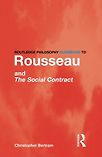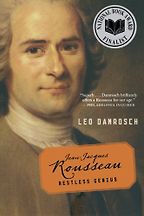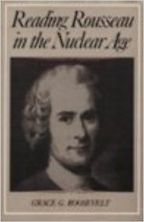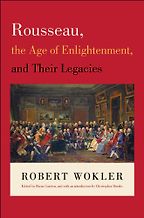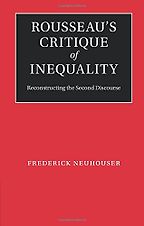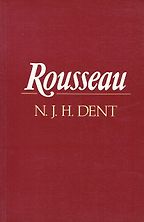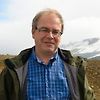How did you first get interested in Rousseau?
Two episodes when I was a teenager were important. The first is that I was on a French exchange programme and my exchange partner’s sister had a boyfriend who was a philosophy student. We talked a lot, and he told me about Rousseau, about Marx, about Nietzsche. They seemed, at the time, to be saying pretty much the same thing as one another. Since then, I’ve come to notice the differences! He got me fascinated. The second important episode occurred back at school when a friend got expelled. We’d been studying Hobbes and Rousseau, and he gave me his copies of Hobbes’s Leviathan and Rousseau’s The Social Contract. So I had my own copy of The Social Contract when I was about 16, and started reading it, and found the text inspiring.
Your first choice is a biography of Rousseau.
This is a one-volume biography by Leo Damrosch. It’s quite racily-written, very readable. There are other biographies of Rousseau, some of them very scholarly: for example, Maurice Cranston’s three-volume biography. Rousseau was a biographer of himself, an autobiographer. The most famous of his autobiographical writings is the Confessions, but there’s also Reveries of a Solitary Walker, and the famous Dialogues, where you have a very paranoid Rousseau in conversation with another character, ‘the Frenchman,’ concerning the faults of an alter ego, Jean-Jacques.
So Rousseau did tell the story of his own life, but Damrosch tells it very well in English. He also has some reflections on the veracity of Rousseau’s own autobiographical writings, which is an interesting aspect of Damrosch’s book. On the whole, he finds that Rousseau was quite truthful. Of course there are elements of the story Rousseau tells about himself where he is self-deceived, or indeed paranoid, but so far as telling the truth about the facts and external events of his life, he seems to have been quite honest with us.
Rousseau had an interesting and varied life. He wasn’t known as a philosopher for most of his lifetime.
That’s right. Rousseau was born in 1712, but didn’t really come to public attention until the 1750s when he was middle-aged — perhaps even late middle-aged, in 18th century terms. Up until that time, he’d been a servant, an itinerant musician and a music teacher. He’d been secretary to the French ambassador in Venice. He’d done all sorts of things, but only became famous as an intellectual later in life.
And then he was more famous as a novelist than as a philosopher, wasn’t he?
He first came to prominence with the Discourse on the Science and the Arts, which was his response to a competition set by the Academy of Dijon. He became a novelist a bit later. He also composed an opera around the same time. His big achievement as a novelist was Julie, or the New Héloïse, and that came out in 1761. It was a scandalous and compelling novel in the context of the 18th century but reads rather drily today.
He was considered something of a dangerous thinker by this time.
In 1762, he published Émile and also The Social Contract. Both of those books got him into quite deep water because of his heterodox views on religion. It was less the politics and more the religion that got him into trouble. He had to flee from France, where he was a wanted man. He sought sanctuary in Switzerland, and eventually, under David Hume’s tutelage, he made it to England, eventually to Staffordshire where he spent most of a year. There his mental health started to deteriorate quite significantly. He thought there were serious plots against him, and that David Hume, in particular, was out to get him. This wasn’t the case. However, Damrosch does reveal that it wasn’t entirely irrational for Rousseau to suspect Hume, because people close to Hume, like Horace Walpole, were ridiculing Rousseau in the press.
Rousseau’s mental health broke down while he was in England. How did his life play out after that?
He went back to France. Although he was still, technically, a wanted man, things had calmed down there. Then two things happened. One was that he got into an argument with the civic authorities in Geneva, of which he was a citizen, who condemned his work. That didn’t play out particularly well. Some of the citizenry wanted to come to his support, but by that time he’d lost interest. He expressed opinions in this dispute that were somewhat in tension with the democratic Rousseau we often think about today. Secondly, he wrote various important works in later life, often in response to commissions from people overseas, such as his republican writings about Poland and Corsica. But mainly, in the later stages of his life, he earned his money by music copying. He led a slightly reclusive life.
“He’d managed to annoy and alienate the people who were his friends, or had generated various fantasies about them.”
The great autobiographical writing at the end of his life is the Reverie of a Solitary Walker. This starts with him saying: ‘Here am I, then, alone upon the earth, having no brother, or neighbour, or friend, or society but myself: the most sociable and loving of human beings.’ That shows a complete lack of self-knowledge. He’d managed to annoy and alienate the people who were his friends, or had generated various fantasies about them. It’s a beautiful book, by the way, perhaps his most elegiac book. But that passage does show this remarkable lack of grasp of who he was. He says, ‘Here I am alone on the earth’ but his companion, Thérèse Levasseur, is there in the background. She was much sneered at by Enlightenment literary circles, because she was not of the right social class, but she was loyal to him to the end.
Given his prominence amongst Enlightenment thinkers, it is hardly surprising that there are a number of biographies of Rousseau. Why did you choose Damrosch’s in particular?
It gives a comprehensive take on Rousseau’s work in one volume, it’s very accessible to the general reader and it’s in English. There are other biographies which are very good and scholarly, but rather dry. If you want a general introduction to Rousseau and his life, a biography that also gives a critical take on his own attempts to write the story of his life, I think this is the best choice.
Your second choice is Reading Rousseau in the Nuclear Age by Grace Roosevelt.
This book came out in 1990 in the US, right at the end of the Cold War. It’s a study of Rousseau’s contribution to the theory of international relations. It’s a book that hasn’t got the attention it deserves. One of the most remarkable things about it is that Grace Roosevelt—in working on this topic and looking at the texts that were extant—realised that one of the most important fragments that we had was really a mess. There’s a text by Rousseau that’s somehow intermediate between the Discourse on Inequality and The Social Contract. Rousseau finished The Social Contract by saying he meant to go on and write about international relations. So the text is called The State of War: Principles of the Right of War. As it existed before Grace Roosevelt got to work, it didn’t make any sense, it seemed to jump all over the place. There was a very simple reason for that: previous editors had got the pages in the wrong order.
“It seemed to jump all over the place. There was a very simple reason: previous editors had got the pages in the wrong order.”
Grace Roosevelt went to the museums in Switzerland that housed some of Rousseau’s manuscript writing and noticed a very simple thing. At the end of each page, there was a word, and that word indexed to the word that ought to follow on on the next page. For some reason, previous editors hadn’t noticed this. What had initially alerted her to the fact the text was in the wrong order was the fact that Rousseau is very good at opening lines. ‘Man is born free, but is everywhere in chains,’ is an example of this from The Social Contract, or the line I’ve already quoted from the Reveries of a Solitary Walker ‘Here am I alone upon the Earth…’. In The State of War, the ringing declaration in the then published edition came on page two or three. She thought, ‘This can’t be right, surely this is how the text is meant to start?’ and she reconstructed it. It’s been reconstructed again, since, by a team of scholars in France led by Bruno Bernardi. They produced a new edition that included some further material, and they re-ordered it slightly. But really, the credit for that rediscovery of a Rousseau text in the 20th century, goes to Grace Roosevelt. It was a tremendous discovery that she made.
Why did she call it Reading Rousseau in the Nuclear Age?
She was concerned to see whether Rousseau’s writings on peace and war, and his engagement with the Abbé de Saint Pierre’s writings on perpetual peace, had relevance for the predicament we found ourselves in during the Cold War, the stand off between East and West and whether it would be possible to have human society, as a whole, ruled by peaceful institutions. Her project was to see whether Rousseau could make a contribution to contemporary understandings of war and peace.
What about your third book choice?
I’ve chosen N.J.H. Dent’s book Rousseau: An Introduction to His Psychological, Social and Political Theory (1989). The reason that I’ve selected this book is that, when it came out, it offered a reconstruction of Rousseau’s moral psychology that has been tremendously influential, including on people like John Rawls and on other political philosophers like Joshua Cohen. I think it’s true to say that most political philosophers in the Anglophone world have basically taken Nick Dent’s ideas on amour propre, amour de soi, and pitié, these basic Rousseauian concepts, and run with them. It was Nick Dent who revolutionised the way that we think about Rousseau’s moral psychology today.
There were writers in the Francophone world who had, to some extent, covered similar ground – Jean Starobinski, for instance, in France, had written about Rousseau’s moral psychology. The orthodoxy, however, in the Anglophone world, had been that Rousseau saw amour propre, this social sense of self-love, as a purely negative and toxic idea. A lot of writers were drawn to a primitivist sense of Rousseau, that, for him, the ideal would have been some kind of regression to a primitive state of humankind. A lot of people over the years have read Rousseau like that. Dent thought they had got Rousseau wrong. While amour propre, it’s true, is usually something toxic, and negative, and destructive, it also can have a positive side to it, and it can correspond to a demand, an instinct, an impulse to seek respect and recognition from other people. It is very closely connected to ideas about justice and equality.
So amour propre isn’t always a selfish self-love, it can be connected with civic virtue?
It can be connected with civic virtue, yes. Rousseau sees us as having two ways in which we can realise and satisfy our demand for social self-love. One of those is via personal relationships: if we’re lucky enough to find a loving relationship with someone who loves us back for ourselves, then that can satisfy this craving for recognition. The other way is a social and political way, so that if we can live together with other people in a just society in relations of equality, then we can enjoy a life where we are valued for our own sake by our fellow citizens, and where we accord to them the same kind of respect that we want them to accord to us. Those relations of equality and reciprocity are essential to the non-toxic version of amour propre.
In recent years philosophers have been showing renewed interest in moral psychology, but for a long time it wasn’t a popular topic. It was considered something different from philosophy.
Yes, there’s been a revival of interest in 18th century moral theory. You can find many parallels to Rousseau’s work in, for instance, Adam Smith’s The Theory of Moral Sentiments and in his idea of the impartial spectator. He’s got a whole story to tell, which is different from Rousseau’s in interesting ways, about how people come to have a mature moral psychology. But you also find ideas about moral psychology in Kant: a lot of the Rousseauian ideas about equality and respect are there in Kantian philosophy, though they are officially de-psychologised because Kantian philosophy is all about ‘reason’ as opposed to affect and sentiment. But some of the same notions are there and have a Rousseauian genealogy.
Let’s move on to your fourth choice.
This is a collection of essays by Robert Wokler, who was one of the foremost Rousseau scholars of the 20th century. It was edited posthumously by Brian Garston, and has an introduction by Christopher Brooke, which puts Wokler’s life and work in context. I thought it important that if we were going to look at five books to do with Rousseau, Wokler was represented. It’s frustrating, in a way, that Wokler never really published a big book on Rousseau. Rather, he published many essays, and a short book for OUP in their ‘Past Masters’ series. But, over the course of a career during which most people thought of him as the person who knew most about Rousseau, he published many discrete essays on particular topics.
One essay in the book that I’d particularly like to mention came out in 1978, in a special edition of Daedalus for the 200th anniversary of Rousseau’s death. It’s called “Perfectible Apes in Decadent Cultures: Rousseau’s Anthropology Revisited.” In the piece, Wokler looks at one passage in particular in Rousseau’s Discourse on the Origins of Inequality. In it, Rousseau has some fascinating speculations about primatology, and whether or not we are of the same species as orang utans. Rousseau points out that there’s only one way to find out and that it would be immoral to try it.
“The insight was that man is good by nature and is made wicked by society.”
There’s lots of fascinating history of ideas detail in the essay. There’s also a paradoxical aspect to what Rousseau says. When he describes the behaviour of really primitive humans in the Inequality, he describes them as wandering solitary through the woods, occasionally meeting up to mate and so on. In doing that, he describes a set of behaviours that actually correspond to the behaviours of just one major ape species, namely the orang utan. So when he talks about whether we’re related to orang utan—whether we’re members of the same species as them—he discusses their behaviour, and our original behaviour, and it looks like what he’s saying might be scientifically accurate. In fact, the creatures that he, or rather French scientists of the time, would have had access to, and which he is probably describing and giving the name ‘orang utan’ to, were chimpanzees or possibly bonobos, which are very social as a species.
I’m fascinated by the idea that Rousseau might have observed great apes. Is there any evidence about this?
I don’t think he observed live specimens. Wokler tells us how people brought back the corpses of ape species from Africa. Rousseau must have relied on explorers’ tales, and on what learned people in Paris, who had dissected apes, wrote about them. These were his sources.
It is, of course, controversial whether Rousseau was giving a semi-scientific view of human evolution in the Discourse on Inequality, or whether he was doing something that doesn’t purport to offer a true account of the origins of the human species, but rather is investigating the origins of certain concepts—concepts of equality and inequality—not telling us a true story, but giving us a kind of conceptual reconstruction.
There’s a tradition of this sort of conceptual reconstruction in political philosophy. Thomas Hobbes for instance, in Leviathan, at least on some readings, gives us a hypothetical account of what life would be like in a state of nature, not a historical account of what it was actually like.
That’s right. Philosophers have been doing this for a long time. You get it in Hobbes, you get in Locke, you get in Plato, even.
It’s interesting to see Rousseau working as an anthropologist, as well as a philosopher and psychologist. There are so many aspects of intellectual enquiry that he was involved in.
Yes. He claimed that all his mature writings were knitted together by a single insight, an insight that sounds simple, but is actually quite complicated and obscure. The insight—which he says came to him in an epiphany as he was walking to the Chateau Vincennes where his friend, Diderot, was imprisoned—is that man is good by nature and is made wicked by society. It allegedly came to him when he read the newspaper containing the competition that led to the Discourse on the Sciences and Arts. And he claimed that this insight united his contributions across a range of different disciplines. Certainly, it is central to his main works.
That sounds as if Rousseau was a pessimist about humanity. He seems to have believed that there as a natural ideal way of living that we have fallen from.
It certainly does sound like that, but Rousseau doesn’t think we can go backwards. He does suggest, in some writings, that there were earlier periods of existence where various impulses were in better balance than they are now. But even those earlier phases of existence—and we’re past the period of people wandering in solitary ways through the forest now—are already stages where people have a certain degree of self-consciousness, where they’ve become conscious of how they appear in the eyes of other people, where notions of vanity and pride already exist in the human species and where there is a certain amount of conflict.
You talked about Rousseau’s driving idea of the natural goodness of humanity and the way that society has corrupted that, to some degree. Fundamental in this natural situation, though, is that there is no hierarchy. There is a natural equality, and any hierarchy is imposed by society. But he himself lived in a very hierarchical society, especially when he was in France…
That’s right. Rousseau thinks that there is a certain amount of natural inequality between people, but this natural inequality is pretty small. It’s true that some people are smarter than other people, and some people are stronger than other people. But those natural differences among people don’t underpin or explain the kinds of inequalities and hierarchies that we find in human society. Rather, he thinks that those inequalities have been generated by convention, by agreement. When I say ‘generated by agreement,’ that already suggests a kind of social contract. But some of those agreements are made without people being fully conscious of what they are agreeing to.
“Natural differences among people don’t underpin or explain the kinds of inequalities and hierarchies that we find in human society.”
The inequalities we find in modern societies are inequalities that rest upon our beliefs, our expectations, our agreements, what we’re prepared to put up with in other people. Rousseau wasn’t necessarily hostile to all of those inequalities, but he thought that inequalities by convention ought to work to the benefit of everyone. The inequalities that we actually find in society—the difference between the one per cent and the many—are not inequalities of convention that can be justified by appealing to everyone’s benefit. Manifestly there are many people who are at the bottom of those hierarchies, who lose self-respect, who lack adequate means to feed themselves, clothe themselves and so on.
This leads smoothly into your last book choice, Rousseau’s Critique of Inequality by Frederick Neuhouser. Why did you choose this book?
This is a recent book: it came out in 2015. It’s an attempt to reconstruct the argument of the second discourse, The Discourse on Inequality.
That was quite a radical book for its time.
Yes, a very radical book for its time. Like the Discourse on the Science and the Arts, it too was an attempt to respond to a prize. The Academy of Dijon set a competition, and Rousseau entered again. This time, he didn’t win. This, the greater work, the more original work, only got second place. I’m sure that Rousseau was disappointed by that. It’s a much more interesting work, although it is quite hard to understand. It gives us a conjectural history of humanity from its earliest time, supposedly, to modernity. It ends with us caught in a nightmare of trying to live in the opinion of other people, a nightmare of competition, vanity, pride, public spectacle, all the things with which we are familiar from modern life. Rousseau asks how we got here.
One of the interesting things about Neuhouser’s book is that he takes seriously Rousseau’s claim that he’s not really trying to reconstruct human history as such. Rather, he’s investigating the presuppositions of ideas of inequality and hierarchy, and of what makes an inequality possible. He’s using the idea of a hypothetical history to try and make some of those ideas vivid, to try to make distinctions between what’s natural to the human race and what’s artificial. He’s not reading Rousseau as an amateur historian. For Neuhouser, Rousseau is trying to produce a genealogy in a similar manner to Nietzsche, much later, does with his Genealogy of Morals.
Is there any evidence to support the idea that it is a hypothetical history —other than the fact that it can’t possibly be true?
Rousseau actually says, right at the beginning of the Discourse on the Origin of Inequality, that it would be impossible to find out the truth of what this history is. All we can do is read this history in the nature of present day humans and ask how we got there. But the original human nature that lies in our distant past is obscured. He has this idea, this picture of a statue: the statue might depict our original human nature, but it’s been eroded by the sea, by the wind. Its features are no longer legible.
We live in an age when all sorts of people are attempting to reconstruct hypothetical stories about what happened in the Pleistocene, without necessarily acknowledging that they are hypothetical.
That’s true, but we have access to archaeological tools today that Rousseau didn’t have access to. So we can do quite a lot of comparative anthropology. We know about the theory of evolution by natural selection, we can look into similarities between us and other primate species and ask what kind of characteristics our nearest common ancestors might have. We can do all of those things, Rousseau couldn’t.
Get the weekly Five Books newsletter
The subtitle of the book you’ve chosen is ‘Reconstructing the Second Discourse.’ Is the author, perhaps, trying to set Rousseau’s book in the best possible light? Interpreting so it makes sense to us now?
Yes, I think that’s right. He’s trying to make it accessible and relevant to people who are familiar with its descendants, the contemporary egalitarian liberal philosophy, particularly the philosophy of people like John Rawls and Elizabeth Anderson, with her notions of relational inequality. They have a relationship to Rousseau’s work. Neuhouser is trying to explain, to people who are more familiar with the modern literature of political philosophy, how Rousseau’s writing fits in to it.
As a causal catalyst for the writing, or as something that parallels the structure of it?
Both, in a sense. I think it’s true that John Rawls’s work could not have been produced without Rousseau as an antecedent. If you read the Theory of Justice, if you read The Social Contract, if you read what Rawls himself had to say about moral psychology, you see all kinds of parallels with Rousseau’s work. The causal relationship is certainly there. What Neuhouser does is make it possible for modern political philosophers to read Rousseau in relation to the modern tradition in political philosophy and also alongside non-philosophical writing on equality, such as Thomas Piketty’s Capital in the Twenty-First Century.
If you had to recommend one book by Rousseau for someone who’d never read anything by him, which would you choose?
The Discourse on the Origin of Inequality would be a good place to start. It’s not too long, and that’s often a plus for the modern reader. It also has such a cornucopia of different ideas: it’s got many passages that capture the imagination. As well as the orang utans, it’s got the contrast between the life of a Carib—an inhabitant of the Caribbean—and a modern minister, a story of incipient inequality and civil war and how the rule of law might actually cement inequality between the wealthy and the poor, it’s got passages about the relationship between technology and progress that presage work by people like Marx and his ideas about historical materialism. It’s got all that in a very short span. So, though it’s, in many ways, a confusing work—and sometimes it’s hard to see what the arguments are supposed to be—it’s the kind of work that can set you off thinking in all kinds of different directions as you read it. It’s very rich.
What’s important about Rousseau? Why should we care about him and his works today?
Rousseau transformed our understanding of many aspects of life. Three or four year ago the French magazine Le Nouvel Observateur produced a special edition on Rousseau and on the front cover it made the following claims for Rousseau: he invented the child, nature, equality, democracy, and the cult of the self. Those are big claims for Rousseau, but they’re not entirely crazy. He made a difference to how we think about all of those things: about our own subjectivity, about politics, about equality. For the range of contribution and impact on Western intellectual culture, Rousseau is a big figure. He’s still a big figure, more than 300 years after his birth.
Five Books aims to keep its book recommendations and interviews up to date. If you are the interviewee and would like to update your choice of books (or even just what you say about them) please email us at [email protected]
Five Books interviews are expensive to produce. If you've enjoyed this interview, please support us by donating a small amount.

